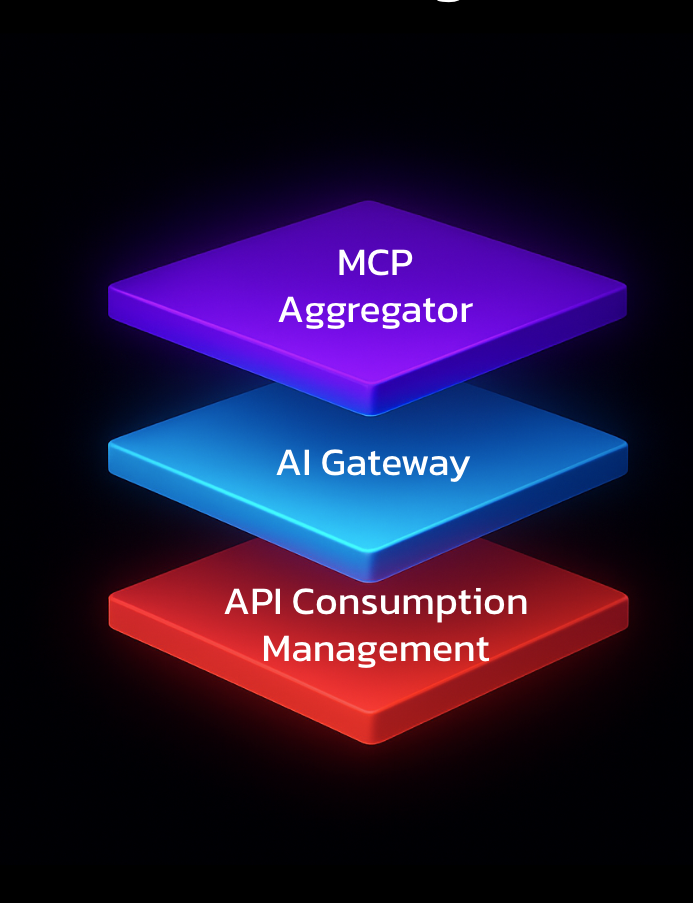
Managing API Consumption from AI Agents with Lunar.dev
This post explores the Need for an API Consumption Layer to Manage the New Wave of AI Agents. Managing the unpredictable behavior of outbound API calls from unconstrained AI agents is a challenge. We dive deep into how AI agents interact with third-party APIs in real-world, production environments.
With the advent of agentic capabilities in AI - companies are increasingly adopting AI agents that are capable of performing complex work fully autonomously. These AI agents rely on API integrations to fetch live data and perform certain actions, introducing unique complexities in API management that traditional solutions weren't designed to handle. This article will discuss several of these challenges, and introduce an approach for mitigating some of them using an API Consumption Gateway.
Understanding AI Agents and Their Need for API Access
At their core, AI agents are software programs that interact with their environment to perform self-determined tasks in pursuit of predetermined goals. What distinguishes them from simpler AI applications is their ability to independently gather information and take actions through API calls. Agents rely on APIs to interact with the outside world - retrieving real-time information and performing actions autonomously.
For example, an AI agent tasked with managing customer support might need to:
- Query a CRM API to retrieve customer information
- Access a knowledge base API to find relevant documentation
- Update ticket status through a helpdesk API
- Send notifications via messaging APIs
The ability to access information and perform actions using APIs makes agents increasingly powerful, but also introduces a host of complexities. Traditionally, APIs are accessed by deterministic code written by developers - ensuring APIs are accessed in predictable ways. However, as AI systems are inherently non-deterministic, there’s little ability to pre-define how APIs will be accessed – opening the door to a set of new challenges.
1. Complex Operations and Error Cascades
AI agents often need to perform operations that require multiple interconnected API calls. For instance, to gather comprehensive customer data, an agent might need to:
- First fetch a customer ID
- Then retrieve their account details
- Finally access their transaction history
Each step introduces potential points of failure, and errors compound across the sequence. Even with 90% accuracy at each step, by the 9th consecutive step, the cumulative effect can lead to a significant drop of up to 39%.
2. Error Handling Complexity
AI agents struggle to handle the wide variety of API errors they encounter:
- Authentication failures
- Rate limiting
- Server errors
- Network timeouts
- Invalid data responses
Without sophisticated error handling, agents may misinterpret errors or fail to recover gracefully, leading to task abandonment or incorrect assumptions about data availability.
3. Limited Visibility
When agents generate and execute API calls autonomously, organizations lose visibility into:
- Which APIs are being accessed
- Frequency of calls
- Success rates
- Performance metrics
- Cost implications
This lack of visibility makes it difficult to debug issues, optimize performance, and ensure compliance with organizational policies.
4. Governance and Security Concerns
Autonomous API access by AI agents raises serious security considerations:
- Risk of excessive or unauthorized API calls
- Potential exposure of sensitive data
- Authentication credential management
- Compliance with data privacy regulations
- Cost control and resource utilization
Solving These Challenges with A Consumption Gateway like Lunar.dev
An API Consumption Gateway can come to our rescue and help mitigate API traffic originating from AI agents in our architecture. They can provide a central point for governing outgoing API traffic, handling common issues such as authorization and rate limits and providing observability for API access. Essentially, our reverse-API gateway will act as a proxy for all agents’ outbound API traffic.

Lunar.dev is an emerging API consumption gateway.
With Lunar.dev, engineering teams of any size instantly gain unified controls to effortlessly manage, orchestrate, and scale API egress traffic across environments – all without the need for code changes.
Lunar.dev’s egress proxy is agnostic to any API provider. Its user-friendly UI management layer enables full egress traffic observability, and provides real-time controls for handling cost spikes or issues in production, all via a simple SDK installation.
Lunar.dev offers solutions for quota management across environments, prioritizing API calls, centralizing API credentials management, and mitigating rate limit issues.
1. Centralized Control and Visibility
Lunar offers:
- Real-time discovery and monitoring of all API calls
- Detailed logging and transaction analysis
- Performance metrics and error tracking
- Cost and usage analytics
- API catalog management
2. Intelligent Traffic Management
- Client-side rate limiting to prevent API quota exhaustion
- Priority queuing for critical requests
- Automatic retry mechanisms with circuit breakers
- Caching to reduce unnecessary API calls
- Traffic smoothing during usage spikes
3. Security and Authentication
- Centralized credential management
- Secure key and certificate injection
- PII and sensitive data screening
- Granular access control at API and endpoint levels
- Authentication flow handling
4. Error Resilience
- Standardized error handling across different APIs
- Automatic retry mechanisms for transient failures
- Circuit breakers to prevent cascade failures
- Clear error reporting and diagnostics
Deploying Lunar for AI Agent Scenarios
A unique challenge with AI agents is their tendency to generate code that directly accesses APIs via well-known URLs. One way to introduce API Consumption Gateways like Lunar.dev is to manually switch the URLs for API calls from their regular URL to the proxy URL. However, because Agents may default to accessing APIs’ well known locations, this approach may prove unreliable (sure, you can ask the AI to comply, but there’s no guarantee that it will - again, remember AI is naturally non-deterministic).
This will require a new approach for funneling requests through to the consumption gateway. Thankfully, there’s an easy way to accomplish this - by intercepting requests made to well-known API domains at the network layer, and funneling them to the proxy instead.
This approach relies on your application running in a private network which you control - this may be a data-center or a private cloud environment. For simplicity, we will refer to AWS’s VPC network and affiliated products in the solution below, but it works similarly on Google Cloud and Azure with their respective products.
The crux of this approach is to hijack the DNS resolution on your private network – and intercept requests made to APIs’ domains. Specifically, for any API domain our agent may use (e.g. api.somethong.com), we create a private DNS record that points to the consumption gateway. So when the AI Agent calls this URL, instead of it resolving and pointing to the public APIs servers, it’ll point to the Consumption Gateway, which will proxy the request after running all applicable policies and modifications on it.
VPC-Based Installation Approach

This deployment method uses DNS poisoning within your VPC to route API traffic through Lunar without requiring code modifications:
- Deploy Lunar Proxy: Install the Lunar proxy on an AWS machine outside your VPC.
- Configure DNS Zones: Create custom DNS zones in Route53 for each API domain you want to route through Lunar.
- Certificate Management:some text
- Create a custom Certificate Authority (CA)
- Generate certificates for proxied APIs
- Add the CA certificate to your service's trust chain
- Route Configuration: Set up Route53 records to direct API traffic to the Lunar proxy.
This approach offers several advantages:
- No code modifications required
- Single stakeholder (infrastructure team) implementation
- Works with "uncontrolled" workloads and legacy applications
- Supports both cloud and on-premises deployments
Implementation Considerations
When deploying Lunar via VPC for AI agents, consider:
- API Discovery: Manually configure DNS records for known APIs your agents will access.
- Certificate Management: Ensure your CA is properly configured and trusted across all services.
- Failover Planning: Consider implementing DNS-level failover using Route53 health checks.
- Horizontal Scaling: Deploy multiple proxy instances for reliability and load distribution.
Conclusion
As AI agents become more prevalent in production environments, managing their API consumption becomes increasingly critical. Lunar.dev provides a robust solution that addresses the unique challenges of agentic API consumption while offering flexible deployment options to accommodate various architectural needs. Through its comprehensive feature set and VPC-based deployment capability, Lunar enables organizations to maintain control, visibility, and security over their AI agents' API interactions without compromising their autonomy or effectiveness.
Ready to Start your journey?
Manage a single service and unlock API management at scale






